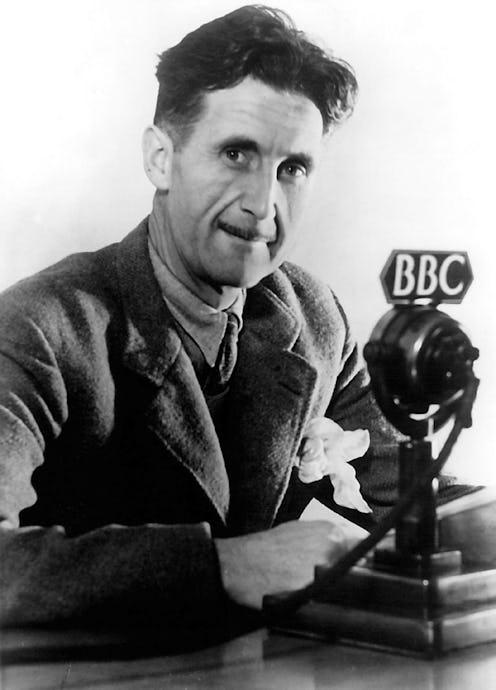Books
10 Best George Orwell Quotes

On June 25, 1903, a boy named Eric Arthur Blair was born in British India. At the age of one, he and his mother moved to England, living in a rural parish on the banks of the Thames. One of his neighbors, a little girl, encountered him for the first time a few years after his move. He was standing on his head in a field. When she asked why he was doing it, he replied, "You are noticed more if you stand on your head than if you are right way up." (Bold, right?)
Later, Eric Blair would publish some of the 20th century's most notable works under the pen name George Orwell. His writing, which includes Nineteen Eighty-Four, Animal Farm, Homage to Catalonia, and essays like "Why I Write," has a style so distinct it has its own adjective: Orwellian. You've probably read at least one of his books in your high school English classes, and if you were anything like me, his frightening but arresting visions of the future just made you want to find more of his work. I appreciate Orwell's writing because he "stood on his head," just like he did when he was four. He wasn't afraid to tackle subjects like poverty, totalitarianism, consumer culture, and civil war, and it did get him noticed.
If Orwell were still alive, today would be his 113th birthday (and he would probably be writing about the Brexit). In honor of his literary legacy, here are ten of the best George Orwell quotes out there. Thanks for making us all terrified of what the political future might bring, Mr. Orwell...
1. "There is something wrong with a regime that requires a pyramid of corpses every few years."
- letter to Humphry House, April 11, 1940
2. "All writers are vain, selfish, and lazy, and at the very bottom of their motives there lies a mystery. Writing a book is a horrible, exhausting struggle, like a long bout of some painful illness. One would never undertake such a thing if one were not driven on by some demon whom one can neither resist nor understand."
- "Why I Write," Gangrel, 1946
3. "In a Society in which there is no law, and in theory no compulsion, the only arbiter of behaviour is public opinion. But public opinion, because of the tremendous urge to conformity in gregarious animals, is less tolerant than any system of law."
- "Politics vs. Literature: An Examination of Gulliver's Travels," Polemic, 1946
4. "There was nothing... except a single Commandment. It ran:
ALL ANIMALS ARE EQUAL
BUT SOME ANIMALS ARE MORE EQUAL THAN OTHERS."
- Animal Farm, 1945
5. "Did Trotsky plot with the Nazis? How many German aeroplanes were shot down in the Battle of Britain? Does Europe welcome the New Order? In no case do you get one answer which is universally accepted because it is true: in each case you get a number of totally incompatible answers, one of which is finally adopted as the result of a physical struggle. History is written by the winners."
- "History is Written by the Winners," Tribune, February 4, 1944
6. "The object of waging a war is always to be in a better position in which to wage another war."
- Nineteen Eighty-Four , 1949
7. "To admit that an opponent might be both honest and intelligent is felt to be intolerable. It is more immediately satisfying to shout that he is a fool or a scoundrel, or both, than to find out what he is really like."
"As I Please," Tribune, December 8, 1944
8. "Power is not a means; it is an end. One does not establish a dictatorship in order to safeguard a revolution; one makes the revolution in order to establish the dictatorship.The object of persecution is persecution. The object of torture is torture. The object of power is power."
- Nineteen Eighty-Four , 1949
9. "It it curious how seldom the all-importance of food is recognized. You see statues everywhere to politicians, poets, bishops, but not to cooks or bacon-curers or market-gardeners."
- The Road to Wigan Pier, 1937
10. "Political language — and with variations this is true of all political parties, from Conservatives to Anarchists — is designed to make lies sound truthful and murder respectable, and to give an appearance of solidity to pure wind."
- "Politics and the English Language," Horizon, 1946
Images: Wikimedia Commons; Bibliophilia, The British Library/Twitter